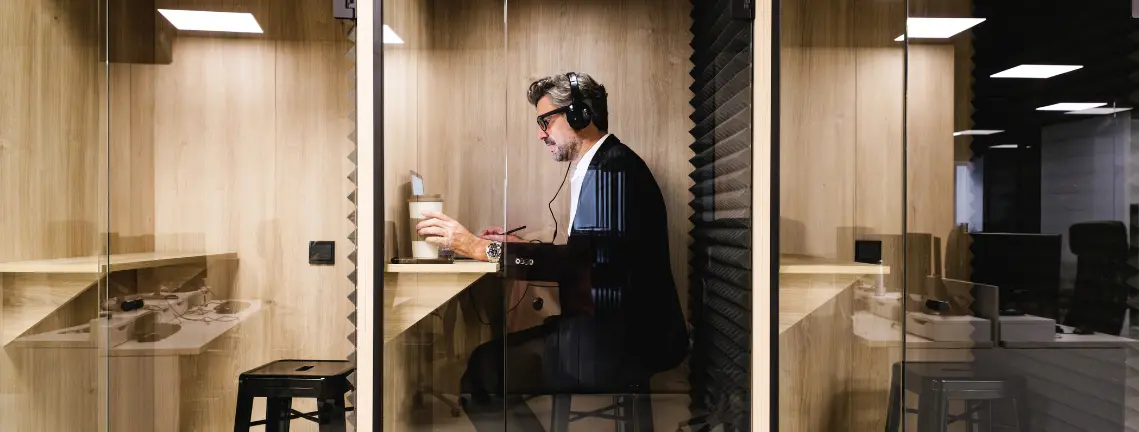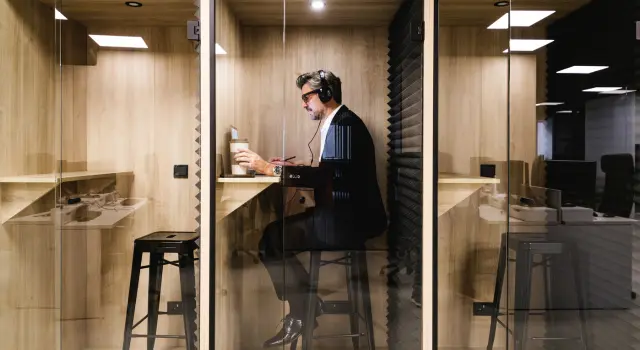How to Create a Focus Zone in Any Office


In an open-plan office culture, distractions are one of the biggest barriers to productivity. Whether it’s the hum of conversation, the ping of constant notifications, or the physical movement of people in your line of sight, staying focused at work is harder than ever. This is where a focus zone comes in, a designated space designed specifically to minimise distractions and enhance concentration.
Codex works closely with Irish businesses of all sizes to create office environments that balance collaboration and concentration. In this blog, we’ll walk you through designing an effective focus zone in any workplace, no matter the size or layout, using practical strategies and product recommendations to bring it to life.
What Is a Focus Zone and Why Is It Important?
A focus zone is a purposely designed area within a workplace that promotes deep work and concentration. Unlike traditional desk setups or collaborative spaces, a focus zone is a quiet, calm environment intended to help employees work without interruption. It doesn’t necessarily require a separate room; even a cleverly partitioned corner with acoustic enhancements and ergonomic furniture can make a significant difference.
The need for adaptable and well-designed office environments has grown in the Irish business landscape, where hybrid working and flexible layouts are now standard. According to an IBEC report, only 22% of workers are fully happy with their current office setup, while over 30% have expressed a need for better layouts and more private spaces. This demand for thoughtfully designed work areas is echoed by a recent Savills survey, which found that 85% of Irish employees would be more inclined to spend additional time in the office if the right facilities were available, including quiet zones and ergonomic workspaces.
It’s becoming clear that creating spaces where employees can concentrate, recharge, and perform deep work is essential to workplace wellbeing and performance in Ireland.
How to Create a Quiet Zone for Employees
STEP 1: IDENTIFY THE RIGHT LOCATION WITHIN YOUR OFFICE
When creating a focus zone, location is everything. Look for naturally quiet areas away from communal kitchens, meeting rooms, or high-traffic walkways. Corners or window-facing spaces often work best. If your office is open-plan, consider creating a micro-zone using modular furniture or privacy screens to carve out a visual and acoustic barrier.
Codex’s Acoustic Office Pods and Suspended Offices are excellent for shielding a space from noise and visual distractions, allowing employees to “tune out” and focus. Depending on your needs and available space, these setups can be fully integrated into your layout or adapted around existing furniture.
KEY POINTS:
- Choose a low-traffic, quiet area for your focus zone
- Use furniture or acoustic panels to define the space
- Codex Acoustic Pods and Suspended Offices create ideal micro-zones
STEP 2: CHOOSE ERGONOMIC AND FUNCTIONAL FURNITURE
The right furniture can make or break your focus zone. Poor posture or uncomfortable seating can lead to physical strain, reducing your ability to concentrate. Equip your focus zone with ergonomic desks and chairs that support comfort for long periods of deep work.
Codex offers a wide range of Sit-Stand Desks, like the Leap Smart Desk, which encourages movement and helps maintain energy levels throughout the day. Pair it with the NV Ergonomic Chair, a journalist favourite recently featured in the Irish Tech News, to promote optimal posture and reduce discomfort.
Add desktop accessories like monitor risers, footrests, and wrist supports from our Leitz Ergo range to help employees customise their workstation for maximum comfort.
KEY POINTS:
- Use ergonomic desks and chairs to support physical comfort
- Codex’s Leap Smart Desk and NV Office Chair promote movement and posture
- Accessorise with monitor risers and footrests for an ideal setup
STEP 3: CONTROL SOUND AND LIGHT
Acoustic comfort is one of the most overlooked aspects of a focus zone. Excessive noise is a major source of distraction, especially in open-plan offices. Incorporate sound-absorbing panels, acoustic partitions, or even noise-cancelling headphones into your focus zone.
Acoustic partitions, in particular, offer a stylish and practical way to reduce ambient noise. If your space allows, you can also install soft flooring or rugs that help dampen sound.
Lighting is just as important; harsh fluorescent lights can strain eyes and disrupt workflow. Opt for adjustable task lighting, which provides a warmer, more natural light that’s easier on the eyes.
KEY POINTS:
- Reduce noise with acoustic panels and sound-absorbing materials
- Improve focus with soft lighting and adjustable desk lamps
- Use rugs and flooring to dampen background noise further
STEP 4: CREATE A TECH-OPTIMISED ENVIRONMENT
A great focus zone is also tech-friendly. Ensure that the space is fully equipped with power outlets, USB ports, and wireless charging stations so employees can stay connected without needing to move around. Use cable management solutions to keep the area tidy and distraction-free.
Integrated desktop hubs and cable trays can be easily installed in any desk setup. You can also add noise-friendly keyboards and accessories to keep things quiet and professional.
KEY POINTS:
- Ensure access to power, USB ports, and charging stations
- Keep the zone clutter-free with cable management tools
- Use quiet-tech accessories for a distraction-free environment
STEP 5: INCORPORATE VISUAL AND SENSORY CALM
The aesthetics of a focus zone can significantly affect how people feel and perform within it. Use calming, neutral colours and minimalistic décor to avoid visual overload. Adding biophilic elements, such as indoor plants or natural wood textures, can lower stress and boost mental clarity.
Similarly, decorative storage solutions blend functionality with a calming design. Even small touches, like a cork noticeboard or a mood-setting aroma diffuser, can help signal that this is a space meant for focus.
KEY POINTS:
- Choose calming, clutter-free aesthetics with neutral tones
- Incorporate nature with biophilic design solutions
- Add subtle sensory elements like diffusers or soft textures
STEP 6: SET CLEAR BOUNDARIES AND EXPECTATIONS
A focus zone only works when it’s respected. Use signage or internal communication tools to set expectations about the space, such as “quiet hours” or “no phone calls.” Encourage teams to treat it as a sacred space for uninterrupted work.
Codex can provide custom signage to help you incorporate the zone into your office’s everyday activities. It’s not just about the space; it’s about creating a culture that values focused time.
KEY POINTS:
- Use signs and comms to establish clear focus zone rules
- Reinforce respect for deep work among your team

A Smart Investment for Irish Workplaces
As employers strive to support employee wellbeing, hybrid productivity, and in-office engagement, well-designed spaces for deep work are increasingly vital. Companies that invest in tailored focus zones report higher employee satisfaction, lower stress, and improved task efficiency.
Whether you're redesigning a corporate headquarters or optimising a small office space, Codex’s expert office furniture team can help you implement a custom solution that meets your business needs.
---
Ready to build your own focus zone?
Open an account today to explore how we can help you design a high-performance focus zone that works for your team. Email us at sales@codexltd.com for product recommendations, furniture quotes, and design consultations.
RELATED ARTICLES:






